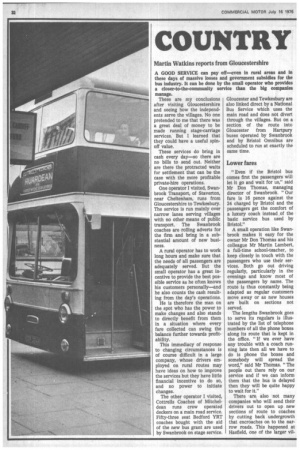COUNTRY
Page 34

If you've noticed an error in this article please click here to report it so we can fix it.
Martin Watkins reports from Gloucestershire
A GOOD SERVICE can pay off—even in rural areas and in these days of massive losses and government subsidies for the bus industry. It can be done by the small operator who provides a closer-to-the-community service than the big companies manage.
These are my conclusions after visiting Gloucestershire and seeing how the independents serve the villages. No one pretended to me that there was a great deal of money to be made running stage-carriage services. But I learned that they could have a useful spinoff value.
These services do bring in cash every day—so there are no bills to send out. Neither are there the protracted waits for settlement that can be the case with the more profitable private-hire operations.
One operator I visited, Swanbrook Transport, of Staverton, near Cheltenham, runs from Gloucestershire to Tewkesbury. The service is run mainly over narrow lanes serving villages with no other means of public transport. The Swanbrook coaches are rolling adverts for the firm and bring in a substantial amount of new business.
A rural operator has to work long hours and make sure that the needs of all passengers are adequately served. But the small operator has a great incentive to provide the best possible service as be often knows his customers personally—and he also counts the cash resulting from the day's operations.
He is therefore the man on the spot who has the power to make changes and also stands to directly benefit from them in a situation where every fare collected can swing the balance further towards profitability.
This immediacy of response to changing circumstances is of course difficult in a large company, whose drivers employed on rural routes may have ideas on how to improve the services but they have little financial incentive to do so, and no power to initiate changes.
The other operator I visited, Cottrells Coaches of Mitcheldean runs crew operated deckers on a main road service. Fifty-three seat Bedford YRT coaches bought with the aid of the new bus grant are used by Swanbrook on stage service, Gloucester and Tewkesbury are also linked direct by a National Bus Service which uses the main road and does not divert through the villages. But on a section of the route into Gloucester from Hartpury buses operated by Swanbrook and by Bristol Omnibus are scheduled to run at exactly the same time.
Lower fares
"Even if the Bristol bus comes first the passengers will let it go and wait for us," said Mr Don Thomas, managing director of Swanbrook. " Our fare is 16 pence against the 24 charged by Bristol and the passengers get the comfort of a luxury coach instead of the basic service bus used by Bristol," A small operation like Swanbrook makes it easy for the owner Mr Don Thomas and his colleague Mr Martin Lambert, a full-time school-teacher, to keep closely in touch with the passengers who use their services. Both go out driving regularly, particularly in the evenings and know most of the passengers by name. The route is thus constantly being adapted as regular customers move away or as new houses are built on sections not served.
The lengths Swanbrook goes to serve its regulars is illustrated by the list of telephone numbers of all the phone boxes along its route that is kept in the office. "If we ever have any trouble with a coach running late then all we have to do is phone the boxes and somebody will spread the word," said Mr Thomas. "The people out there rely on our service and if we can inform them that the bus is delayed then they will he quite happy to wait for it."
There are also not many companies who will send their drivers out to open up new sections of route to coaches by cutting back undergrowth that encroaches on to the narrow roads. This happened at Hasfield, one of the larger vii




































































































